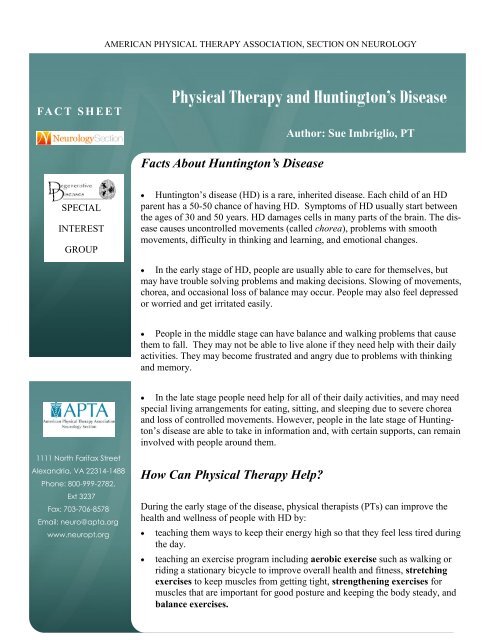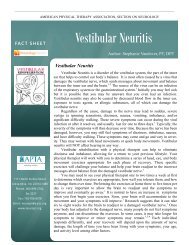Physical Therapy and Huntington's Disease - Neurology Section
Physical Therapy and Huntington's Disease - Neurology Section
Physical Therapy and Huntington's Disease - Neurology Section
Create successful ePaper yourself
Turn your PDF publications into a flip-book with our unique Google optimized e-Paper software.
AMERICAN PHYSICAL THERAPY ASSOCIATION, SECTION ON NEUROLOGYFA C T S H E E T<strong>Physical</strong> <strong>Therapy</strong> <strong>and</strong> Huntington’s <strong>Disease</strong>Facts About Huntington’s <strong>Disease</strong>Author: Sue Imbriglio, PTSPECIALINTERESTGROUPHuntington’s disease (HD) is a rare, inherited disease. Each child of an HDparent has a 50-50 chance of having HD. Symptoms of HD usually start betweenthe ages of 30 <strong>and</strong> 50 years. HD damages cells in many parts of the brain. The diseasecauses uncontrolled movements (called chorea), problems with smoothmovements, difficulty in thinking <strong>and</strong> learning, <strong>and</strong> emotional changes.In the early stage of HD, people are usually able to care for themselves, butmay have trouble solving problems <strong>and</strong> making decisions. Slowing of movements,chorea, <strong>and</strong> occasional loss of balance may occur. People may also feel depressedor worried <strong>and</strong> get irritated easily.People in the middle stage can have balance <strong>and</strong> walking problems that causethem to fall. They may not be able to live alone if they need help with their dailyactivities. They may become frustrated <strong>and</strong> angry due to problems with thinking<strong>and</strong> memory.In the late stage people need help for all of their daily activities, <strong>and</strong> may needspecial living arrangements for eating, sitting, <strong>and</strong> sleeping due to severe chorea<strong>and</strong> loss of controlled movements. However, people in the late stage of Huntington’sdisease are able to take in information <strong>and</strong>, with certain supports, can remaininvolved with people around them.1111 North Farifax StreetAlex<strong>and</strong>ria, VA 22314-1488Phone: 800-999-2782,Ext 3237Fax: 703-706-8578Email: neuro@apta.orgwww.neuropt.orgHow Can <strong>Physical</strong> <strong>Therapy</strong> Help?During the early stage of the disease, physical therapists (PTs) can improve thehealth <strong>and</strong> wellness of people with HD by:teaching them ways to keep their energy high so that they feel less tired duringthe day.teaching an exercise program including aerobic exercise such as walking orriding a stationary bicycle to improve overall health <strong>and</strong> fitness, stretchingexercises to keep muscles from getting tight, strengthening exercises formuscles that are important for good posture <strong>and</strong> keeping the body steady, <strong>and</strong>balance exercises.
AMERICAN PHYSICAL THERAPY ASSOCIATION, SECTION ON NEUROLOGYHuntington’s <strong>Disease</strong>SPECIALINTERESTGROUPAt the middle stage, PTs provide valuable advice about:exercises to improve balance <strong>and</strong> prevent falls.equipment such as wheeled walkers or wheelchairs to help the person to be ableto move around safely.ways to make the home safe such as reducing clutter or slippery surfaces to preventfalls.To help people with HD in the late stage be as active as possible, PTs can:suggest special chairs to help with the ability to eat.teach caregivers how to help the person get in <strong>and</strong> out of a bed or car.teach caregivers how to do exercises that keep muscles loose <strong>and</strong> promote generalwell-being.1111 North Farifax StreetAlex<strong>and</strong>ria, VA 22314-1488Phone: 800-999-2782,Ext 3237Fax: 703-706-8578Email: neuropt@apta.orgwww.neuropt.orgCopyright © 2010 by the American <strong>Physical</strong> <strong>Therapy</strong> Association
















